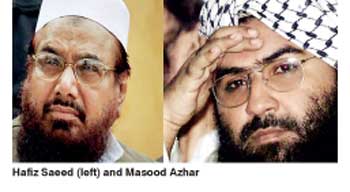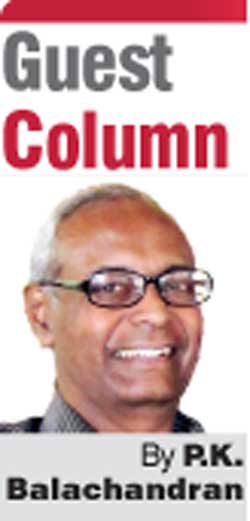Friday Feb 20, 2026
Friday Feb 20, 2026
Saturday, 25 November 2017 00:41 - - {{hitsCtrl.values.hits}}
 Hafiz Saeed and Masood Azhar, two prominent Pakistani terrorists, have vitiated all efforts to improve relations between India and Pakistan.
Hafiz Saeed and Masood Azhar, two prominent Pakistani terrorists, have vitiated all efforts to improve relations between India and Pakistan.
Efforts by civilian governments in Pakistan to improve relations with India have floundered on the twin issues of Kashmir and cross-border terrorism. When it comes to cross-border terrorism, accusing fingers are pointed at Saeed and Azhar, the principle perpetrators of such acts who are based in Pakistan, enjoying the support of the country’s military intelligence, the most powerful institution in that country.
Hafiz Saeed
Saeed is the prime suspect in the Mumbai serial blast case – 165 people were killed and 308 were injured in bomb blasts across Mumbai from 26 to 29 November 2008 – and Azhar had masterminded the attack on the Indian Parliament in December 2001. The hijacking of an Indian Airlines plane in December 1999 was carried out by the Harkat-e-Mujahideen to secure Masood Azhar’s release from an Indian prison. More recently, in 2016, Azhar’s group Jaish-e-Mohammed (JeM) had staged an attack on an Indian Air Force base in Pathankot in Indian Punjab.
Initially Pakistan denied any involvement in the Mumbai blasts. But under pressure from the West and India, which gave evidence of the involvement Saeed’s Lashkar-e-Taiba (LeT), he was put under arrest in September 2009. However, he was released a month later. Since January this year he had been under house arrest until he was released by a court last Wednesday.
 Saeed heads the Lashkar-e-Taiba (LeT), the Jamaat-ud-dawa (JuD), and a new organisation Tehreek Azadi Jammu Kashmir (TAJM). He had had the open support of the former Director General of the ISI, Gen. Hamid Gul, who, until his death, was appearing on JuD political platforms. In fact, political leaders of all hues have attended his rallies.
Saeed heads the Lashkar-e-Taiba (LeT), the Jamaat-ud-dawa (JuD), and a new organisation Tehreek Azadi Jammu Kashmir (TAJM). He had had the open support of the former Director General of the ISI, Gen. Hamid Gul, who, until his death, was appearing on JuD political platforms. In fact, political leaders of all hues have attended his rallies.
Given the odium that the LeT had acquired internationally after the Mumbai blasts, Saeed had turned it into a “social welfare organisation” giving it a new name, Jaamat-ud-Dawa (JuD).
Saeed was released from house arrest by the Lahore High court on Wednesday “for lack of evidence”. The court said that the Punjab Provincial Government which wanted his detention to be extended, had failed to give “concrete evidence” of his involvement in terrorist activities.
But the UN, the US and India are convinced that the LeT was involved in multiple attacks in Afghanistan and India. The US had designated Saeed in 2009 and put a prize of $ 10 million on his head. Ajmal Kasab, the only attacker to be caught after the Mumbai blasts, had disclosed that they were masterminded by the LeT headed by Saeed.
Pakistan had pleaded inability to proceed any further in the case on the grounds that India had failed to produce evidence that could be used in courts. But India maintained that it had given actionable evidence.
“The entire conspiracy in the Mumbai terror attack case was hatched in Pakistan. All the terrorists came from Pakistan. All the planning was done in Pakistan. All the support was rendered from Pakistan. So all the evidence to implicate the mastermind of the Mumbai terror attack is available in Pakistan. So the so-called concrete evidence that the Pakistani authorities are seeking is already available in Pakistan. All they need to find is the requisite political will,” the then Indian External Affairs Ministry spokesman Vikas Swarup had said in February this year.
India reacted very sharply to Saeed’s release on Thursday. “His release confirms once again the lack of seriousness on the part of the Pakistani Government in bringing to justice perpetrators of heinous acts of terrorism including by individuals and entities designated by the UN,” said the current External Affairs Ministry Spokesman Raveesh Kumar.
“It is evident that Pakistan has not changed its policy of shielding and supporting non-State actors and its true face is visible for all to see,” he added.
The release of Saeed will vitiate India-Pakistan relations further and give a fillip to the ongoing insurgency in Kashmir, which is evident from Saeed’s statement to the media after his release.
“This is the victory of Pakistan’s independence and, God willing, Kashmir too will become independent because I’m fighting the case of Kashmir… It is because of Kashmir that India is after me, but all its efforts have been in vain. I pray to God to help me and members of JuD that we can play a strong role for Pakistan’s independence and Kashmir’s independence,” Saeed said.
Masood Azhar
Masood Azhar’s outfit Jaish-e-Mohammed (JeM)’s attack on the Indian Parliament in December 2001 had brought India and Pakistan to the brink of a full-scale war.
Pakistan detained Azhar for a year but he was never formally charged. And to India’s chagrin, the Lahore High Court ordered an end to the house arrest on 14 December 2002.
The 2016 attack on the Indian Air Force base in Pathankot was masterminded by Masood Azhar and his brother. They were in direct touch with terrorists even after the attack began.
The US Treasury has prohibited Americans from “engaging in any transactions” with three Pakistan-based militants and a front group, the Al Rehmat Trust, an operational front for Azhar’s JeM.
But the Indian bid to get Azhar designated by the UN has not succeeded given China’s support for Pakistan on “technical grounds”.
China is using the Azhar ban issue to needle India, which is opposing its ambitious Belt and Road project and is also refusing to negotiate Beijing’ claims on the China-India border, especially in regard to the Indian state of Arunachal Pradesh which China calls “Southern Tibet”.
By putting a spoke in the wheel on the Azhar issue, China has become an inescapable factor in the Indo-Pak standoff on cross border terrorism and Kashmir. Its support to its “all weather friend” Pakistan on this issue has complicated India-Pakistan relations and made the search for a solution all the more harder.